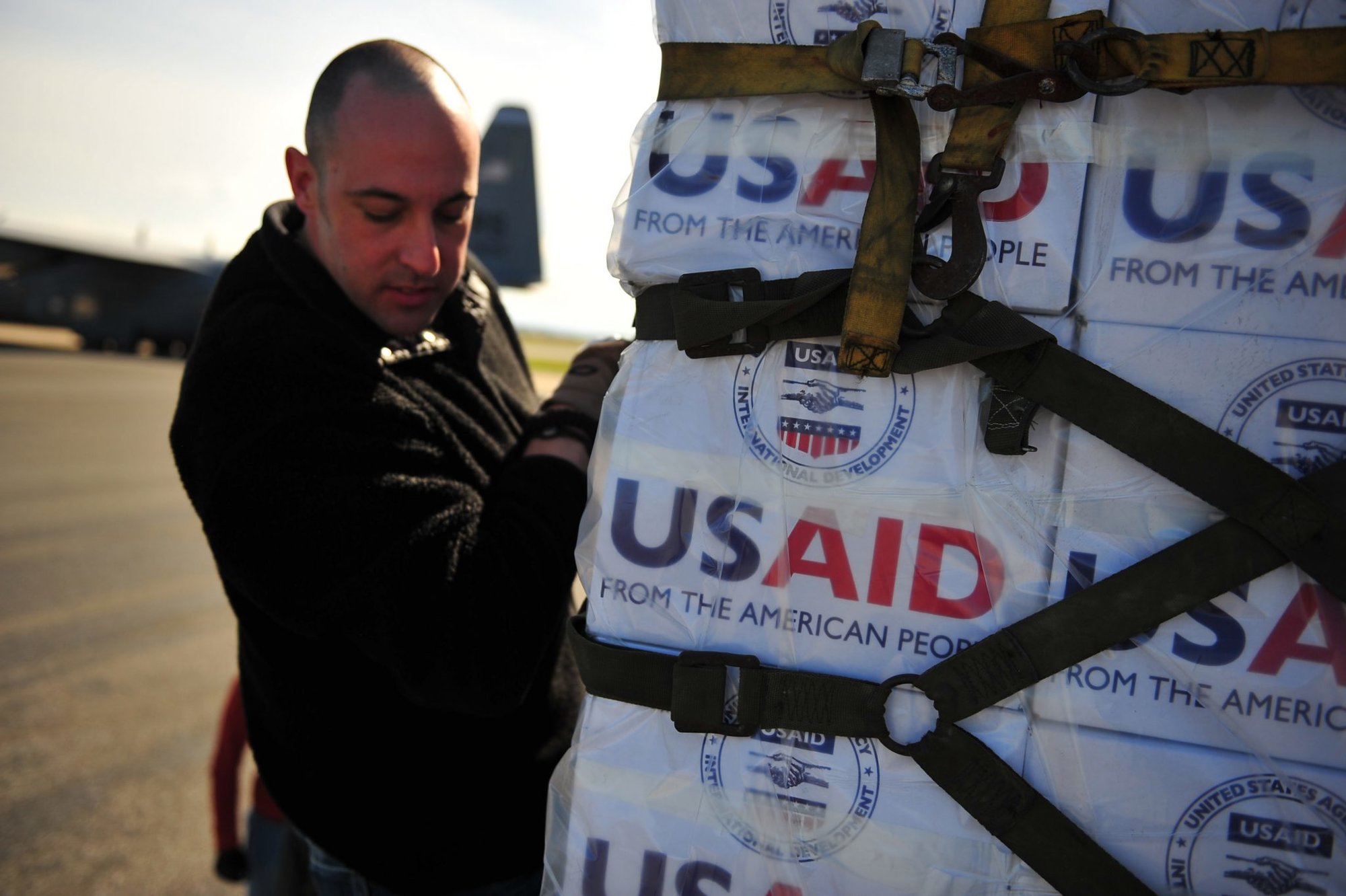
March 4th 2011, U.S. Airmen from the 435th Air Mobility Squadron out of Ramstein Air Base load blankets, tarps and water containers onto C-130 aircraft in Pisa, Italy. These aircraft will then fly these supplies to Tunisia. The U.S. Government is working intensely with the International community to meet the humanitarian needs of the Lybian people and others in the country who fled across the borders. U.S. Army Photo by Staff Sgt. Brendan Stephens. Approved for Public Release
Days before President Donald Trump signed into law a $900 billion bill that provides financial aid to millions of struggling Americans, he decried the legislation on Twitter, citing several line items he objected to in the omnibus Consolidated Appropriations Act (CAA), including foreign aid appropriations and funding for other departments in the federal government that did not seem to have a direct connection to the pandemic.
Attaching controversial legislation to important bills that make it difficult for members of Congress to vote against them is a common practice in the halls of Congress, and Trump’s intent was to try and force legislators to increase direct stimulus checks of $600 per person for COVID relief to $2,000 per person — an initiative that representatives in the House passed Monday in follow-up legislation that seems unlikely to advance in the Senate.
— Donald J. Trump (@realDonaldTrump) December 23, 2020
As a result, foreign aid became a hot political topic on social media. You may have seen graphics and memes like the following in your social media feeds:
This political meme, like many others, takes important information out of context. Paying to help foreigners while Americans are in trouble strikes many people as abominable, but the meme is based on the premise that all higher-priority issues must be completely solved before dealing with lesser issues.
In the 1960s, this was put in terms of “Why are we going to space when we have problems here on Earth?” Just because a certain item is a higher priority than something else doesn’t mean that the lower-priority item cannot or should not be taken care of.
Problems our nation faces are seldom mutually exclusive, and neglecting lesser priorities rarely accelerates achieving the higher ones, as they are already getting the resources they need.
All the foreign aid listed in the popular meme amounts to less than $5 billion, compared with a COVID relief package of over $900 billion. Another $5 billion would barely move the needle on the COVID package, but it can make a big difference overseas.
American foreign policy doesn’t take a hiatus because of a pandemic, and foreign aid is an important tool of that policy. While serving at CENTCOM, Gen. James Mattis said, “If you don’t fund the State Department fully, then I need to buy more ammunition, ultimately.” This principle applies to American “soft power” as a whole.
Buying beans and bandages in foreign countries now is an important tool that helps the US avoid needing to buy bullets in those countries later. To give a famous example — depicted well in both the book and movie Charlie Wilson’s War — the US neglected to provide aid to Afghanistan following the defeat of the Soviets by the mujahedeen. This left a void that was filled by the Taliban and Al Qaeda. Some political leaders believe that if the US had remained engaged and invested in aid to Afghanistan, the Taliban’s ascendance might have been prevented and the Global War on Terror ultimately avoided. The GWOT has cost more than $6 trillion so far. Foreign aid investments to Afghanistan before 2001 would have been a pittance in comparison.
From a national power standpoint, foreign aid provides goodwill and leverage — the underpinnings of soft power. Soft power is often slighted, especially among hawkish military audiences, but it’s often more useful than military “hard power.” Ultimately, military power is nearly useless in any situation where the US is not willing to sacrifice lives to achieve its goal. Most international affairs don’t call for fighting and dying, nor should they.
The US already gives far less aid proportionate to its GDP than many others, and if the US doesn’t provide foreign aid, other countries will. Falling behind Norway on foreign aid is one thing, but the US is increasingly falling behind China, which is aggressively using foreign aid — mostly in its vaunted “Belt and Road Initiative” — to obtain political leverage, as well as port and infrastructure access, throughout the world. These places include South Asia, Africa, and even our own backyard — Latin America.
Before the US entered World War II, American foreign aid to allied nations was the foundation of the “Arsenal of Democracy” that held fascism at bay. Foreign aid today is no less valuable. While how much, where it should go, and when it should go is open for debate, it is nonetheless an important tool in America’s foreign policy toolbox.

BRCC and Bad Moon Print Press team up for an exclusive, limited-edition T-shirt design!
BRCC partners with Team Room Design for an exclusive T-shirt release!
Thirty Seconds Out has partnered with BRCC for an exclusive shirt design invoking the God of Winter.
Lucas O'Hara of Grizzly Forge has teamed up with BRCC for a badass, exclusive Shirt Club T-shirt design featuring his most popular knife and tiomahawk.
Coffee or Die sits down with one of the graphic designers behind Black Rifle Coffee's signature look and vibe.
Biden will award the Medal of Honor to a Vietnam War Army helicopter pilot who risked his life to save a reconnaissance team from almost certain death.
Ever wonder how much Jack Mandaville would f*ck sh*t up if he went back in time? The American Revolution didn't even see him coming.
A nearly 200-year-old West Point time capsule that at first appeared to yield little more than dust contains hidden treasure, the US Military Academy said.













